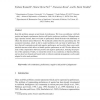Free Online Productivity Tools
i2Speak
i2Symbol
i2OCR
iTex2Img
iWeb2Print
iWeb2Shot
i2Type
iPdf2Split
iPdf2Merge
i2Bopomofo
i2Arabic
i2Style
i2Image
i2PDF
iLatex2Rtf
Sci2ools
134
Voted
JETAI
2010
2010
From soft constraints to bipolar preferences: modelling framework and solving issues
Real-life problems present several kinds of preferences. We focus on problems with both positive and negative preferences, that we call bipolar preference problems. Although seemingly specular notions, these two kinds of preferences should be dealt with differently to obtain the desired natural behaviour. We technically address this by generalizing the soft constraint formalism, which is able to model problems with one kind of preferences. We show that soft constraints model only negative preferences, and we add to them a new mathematical structure which allows to handle positive preferences as well. We also address the issue of the compensation between positive and negative preferences, studying the properties of this operation. Finally, we extend the notion of arc consistency to bipolar problems, and we show how branch and bound (with or without constraint propagation) can be easily adapted to solve such problems.
Related Content
| Added | 28 Jan 2011 |
| Updated | 28 Jan 2011 |
| Type | Journal |
| Year | 2010 |
| Where | JETAI |
| Authors | Stefano Bistarelli, Maria Silvia Pini, Francesca Rossi, Kristen Brent Venable |
Comments (0)

